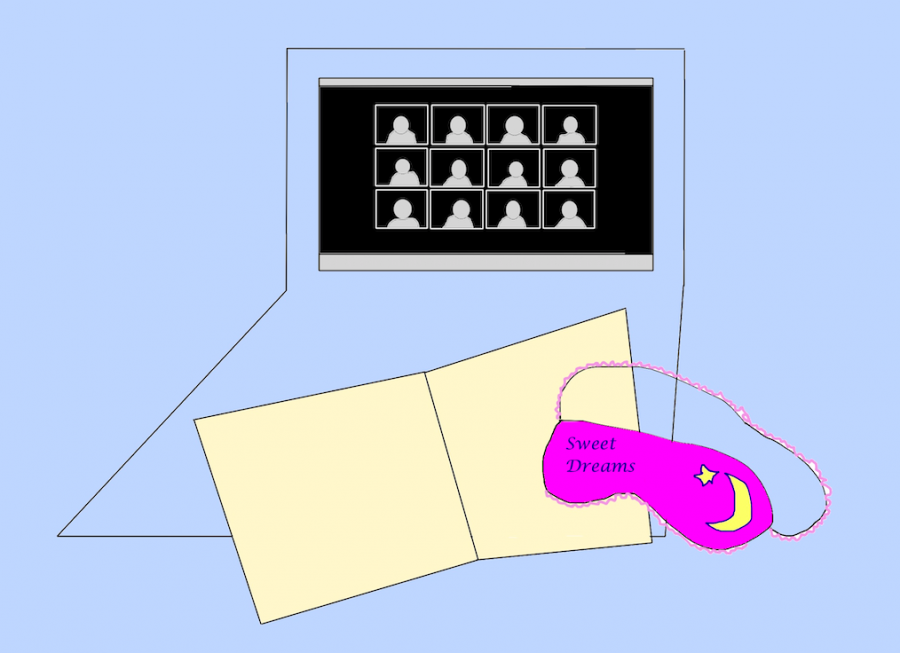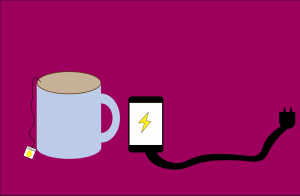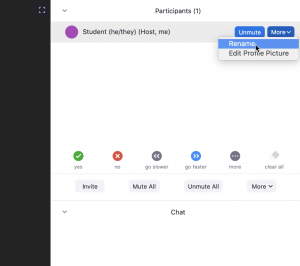Zoom Fatigue Is the Other Viral Epidemic Hitting Colleges
How to stay awake during your next video call
March 10, 2021
Three classes, an appointment with your adviser, a meeting for your campus organization and a game night with your besties: What was once a normal day in pre-COVID-19 life sounds like an exhausting, screen-filled day of turning off your camera, lying down in bed and paying just enough attention to hear if your name is called. If this has become your daily habit, you’re not alone, and you’re probably suffering from Zoom fatigue.
This epidemic is affecting college students and remote workers around the world, and it can only be stopped if we change our approach to virtual calls.
What Is Zoom Fatigue?
Zoom fatigue is the feeling of exhaustion and loss of motivation caused by the excessive remote videoconferencing work that has become the norm over the past year. This is more than a small phenomenon, and Stanford researchers have pinpointed some of the main causes of this epidemic.
We’re used to getting comfortable in social settings, but in a videoconference setting, we’re constantly on stage, and even if just on a subconscious level, it does affect us.
For one thing, making constant eye contact with dozens of up-close faces all at once is not like having a natural conversation. The study also cites seeing constant, real-time footage of yourself, a decrease in mobility while in video calls, and the extra thought and attention that go into virtual social interactions as contributors to feelings of exhaustion during virtual meetings.
Everyone knows that the world of remote work is exhausting, but it doesn’t have to be. We’re all guilty of accepting remote work and its shortcomings because we never thought it would last this long, but now it’s time for a change.
We’re Trying to Compensate for Losing the ‘Normal’ World
One of the reasons Zoom meetings are so exhausting is that they’re made with one goal in mind: compensating for the loss of in-person interaction. Zoom has always been viewed as a temporary solution, but as the pandemic passes its first anniversary in the U.S. and more and more students and workers decide to stay remote, there need to be permanent changes to how we approach virtual meetings.
Zoom meetings can provide a bare minimum of socialization and connection that we’ve all been desperately craving, but we’d be kidding ourselves if we thought it was equivalent to in-person interaction. The fact is, Zoom is just not the same as our old lives.
We’re used to getting comfortable in social settings, but in a videoconference setting, we’re constantly on stage, and even if just on a subconscious level, it does affect us. Changes need to be made on a personal and institutional level to make everyone’s online days a little less stressful.
Can Professors Give Us a Break?
Although instruction is an invaluable part of a college education, many professors are cutting meetings a few minutes short or canceling them altogether. To compensate for this, students are expected to complete more assignments on their own or teach themselves asynchronously. For some, it can be hard to stay motivated through asynchronous learning, but it can give students and professors a break from constantly being in online meetings.
In a less extreme scenario, some professors cancel online classes every now and then and give an alternative assignment or end class a few minutes early. It certainly isn’t ideal to sacrifice more instructional time when it’s already difficult to teach in a remote setting; however, if Zoom fatigue is stopping students from being productive in class, professors should search for the balance between Zoom and asynchronous work.
On Meetings That Could Be an Email …
The best way to prevent Zoom fatigue is to avoid hosting meetings when they aren’t necessary. If you currently rely on video chat for all of your social interactions, give audio-only phone calls a try, or get creative with other forms of communication, like texting, Snapchat and other forms of social media.
If you have leverage in a professional setting and are considering hosting a Zoom meeting for your class, organization, office or another group, ask yourself: How necessary is it that this meeting is conducted through Zoom? Do you have some other method of communicating with this group? Have you required a substantial amount of videoconferencing in the past? After reflecting on these questions, reconsider whether or not holding a videoconference will enhance the experience of attendees.
Individuals and institutions need to recognize that self-care is also important in a remote work setting and that students should not over-rely on videoconferencing services.
For circumstances where a meeting is necessary, try letting everyone turn their cameras off. It may sound small, but it makes a big difference in keeping people connected without forcing them to conform to the strict rules of Zoom etiquette.
What Can You Do to Combat Zoom Fatigue?
For starters, self-care is more important in this environment than ever before. Scheduling a day without video calls or trying to find substantial break times between meetings can be helpful. Although it’s easier said than done, use this time for a screen break by working on different types of projects, spending time outdoors or safely being social in person with members of your bubble.
While in meetings, try turning off self view to prevent yourself from worrying too much about how you appear on camera. It can also help to get up and walk around at least once an hour, and as much as others may hate it, to take a short break with your video off.
Don’t be afraid to cancel unnecessary meetings or bring up your concerns to your boss, professor or any other host if Zoom is taking a serious toll on your health. Chances are, your Zoom host probably feels just as tired as you do, and bringing this to their attention can help change the way we think of remote work one step at a time.
Going Forward
To be clear, Zoom is not useless. It is an important tool for conducting meetings in the current environment and will remain so in the post-COVID-19 world. However, individuals and institutions need to recognize that self-care is also important in a remote work setting and that students should not over-rely on videoconferencing services. Remember that although you’re home, you still need to take a break every now and then. Don’t be afraid to advocate for yourself while working remotely.















Mr. Maher • Mar 13, 2021 at 6:31 pm
Fantastic article. Great suggestions.